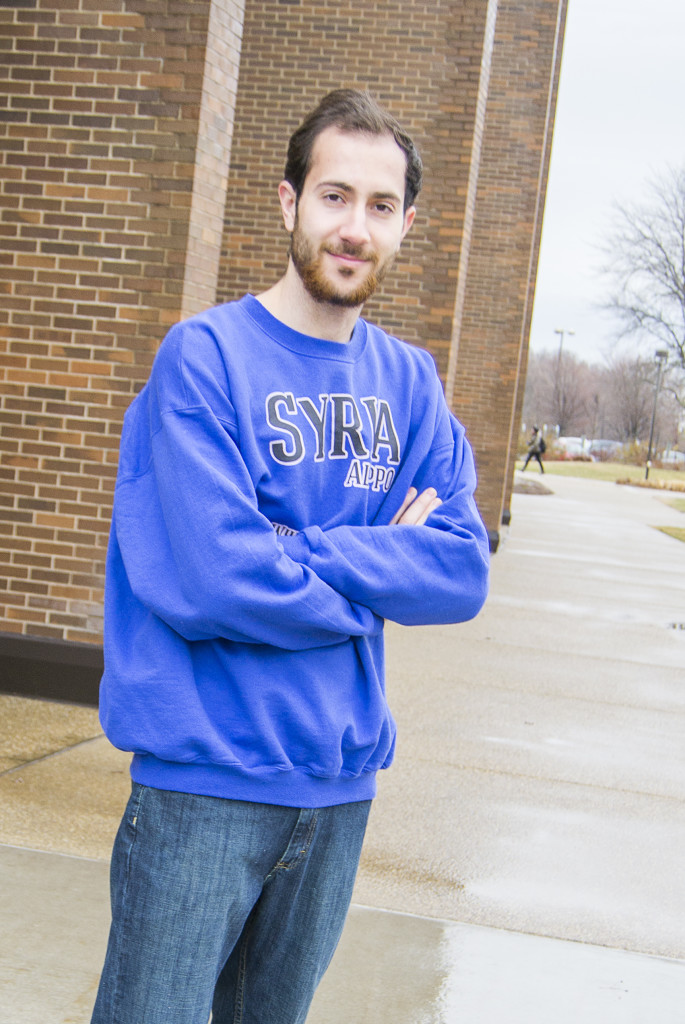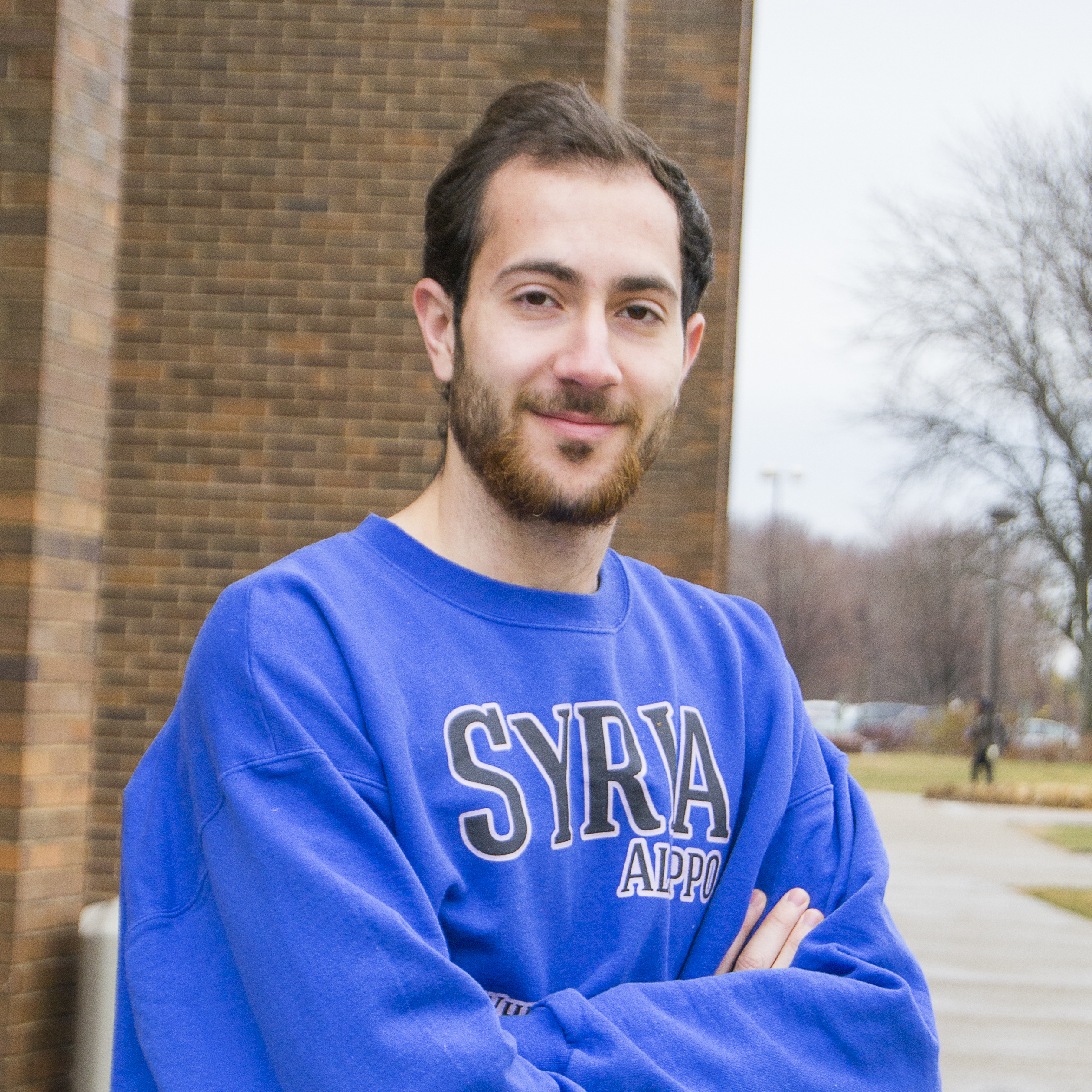Finding Peace in a Time of War

TERESA WILLIAMS | THE HARBINGER
By Kayla N. Tyler
EAST PEORIA – America the beautiful, the land of opportunity. For many of those living outside of the United States, this nation offers several options not readily available to them in their own countries. This rings true for international student Nael Mashkhas, 21.
Mashkhas is a Syrian native and is currently studying engineering at Illinois Central College.
He left his homeland of Syria in September of 2013 in hopes of bettering his education and also to escape the violent war that has overtaken his home.
Syria is presently undergoing a civil war between its government and citizens – a war that is now on its fourth year and has left the country in distress and turmoil.
After learning from friends that the regime army was collecting young citizens for the war, Mashkhas made the decision to leave Syria for the United States.
This choice was not easy for Mashkhas to make as he was forced to leave behind the life and people he knew and loved.
“My family [is] there [in Syria] and this is the most [difficult] because my family is not here,” Mashkhas said. “My family, they don’t want to come to here. My father and mother, they were here when I came, but they [are] back [in Syria now]. They don’t want to stay here…it’s [a] different life; it’s different people.”
Communication has created additional challenges for Mashkhas. His first language is Arabic, and despite being an English speaker, his knowledge of the language is limited as most of it was gathered during his relatively short time in America.
To assist him in learning the English language, Mashkhas reads English-language literature and watches American films.
“It’s so hard for me. I’m from Syria; I look at it and it’s hard,” Mashkhas said of his experience with English. “I have [a] book for read[ing], but just I finish[ed] the first page. The English, it’s hard.”
Trying to obtain Temporary Protected Status from the U.S. government has proven to be another difficult task for Mashkhas, who is currently here on a visitor visa. TPS would allow Mashkhas to stay in the United States for two more years or until the civil war in Syria subsides. Despite the millions of Syrians displaced since 2011, according to U.S. Citizenship and Immigration Services, the U.S. has only granted about 5,000 Syrians TPS since 2012. And one must obtain a visa to qualify for TPS.
“It’s so hard [to even obtain a visa]. A lot of people I know tried to come here, but no, it [did] not work. I came as a visitor visa and right now I’m changing the visa — to TPS,” Mashkhas said.
Returning to Syria at this time could be very dangerous for Mashkhas as it could result in his nation’s government forcing him into the war, exposing him to the country’s current state. Mashkhas fears that if he is sent back to Syria, the regime army will force him to participate in heinous crimes and fight against his own people, as they have with his brother and many other citizens.
Numerous other citizens, like Mashkhas, have fled Syria for safer environments away from the bombings, gunfire and poverty that have become the country as of late. A few of Mashkhas’ friends have even fled Syria to places such as Germany, Sweden, and Italy.
While the war rages on between the government and citizens in Syria, so does the war with ISIS. The terrorist organization has created an additional threat for citizens.
“You know the regime is so bad, but ISIS…ISIS is so bad; [it’s] the worst thing ever,” Mashkhas stated. “You know, all America now is speaking about ISIS and Islam, and ISIS is not Islamic people. They make Islam look so bad.”
Though there have been barriers and he has had to make several sacrifices, Mashkhas believes that he has been given many opportunities by coming to the United States that he would not have received at home.
“Here it’s what you want, what you want [for] your future. [The government is] going to help you here. In Syria, you’re not going to [receive help]. Just maybe your parents [are] going [to] help you, but maybe they can’t if they don’t have the money. But here, no, you can do it, you can do what you want,” Mashkhas said.
While his primary focus is his studies, Mashkhas also hopes to pursue other opportunities while attending Illinois Central College. One of his favorite pastimes while living in Syria was playing soccer, and he hopes to continue that while away from home.
“I play soccer in Syria with my friends, my family, my cousins; I played for maybe ten years. Here, I’m trying to play. I’m trying to play here maybe next semester if they like my skills. Really, I don’t care if it’s a team or not, just I want to play,” Mashkhas said.
While he appreciates his time in the United States, Mashkhas misses his home dearly and would like to return once the war concludes. He hopes it will not take too long before the war ends, but believes with ISIS, this war could rage longer.
“I enjoy it here—my study, everything, my friends—but I think a lot about Syria and what is going to happen and the memories,” Mashkhas said. “[I] hope Syria gets back [to peace]. I respect the U.S. for the help it’s given to Syria.”

